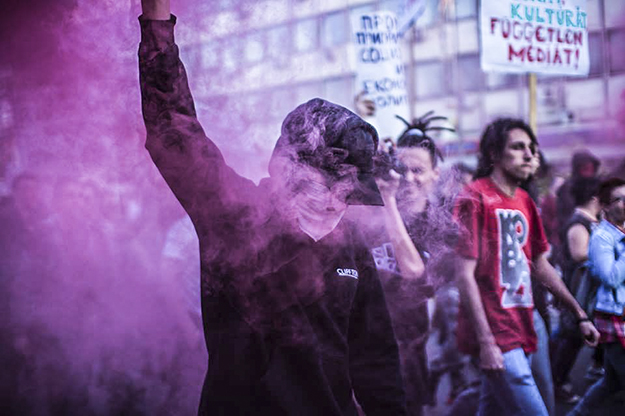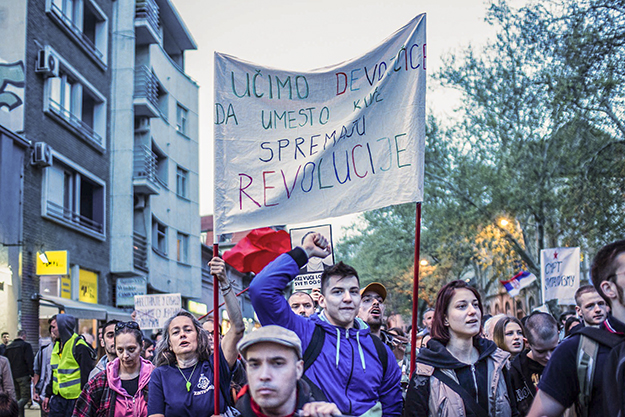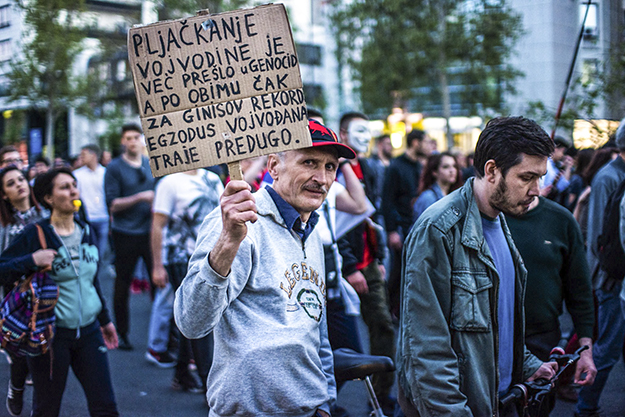On April 12 the unceasing revolt against the new president elect reached its 10-day anniversary. What would usually have been just another 10 days of mundane life filled with busy traffic, hard toil and endless study turned out to be much more for hundreds of thousands that marched the streets of Serbian cities protesting against the corrupt, elite-run system and the man that embodies the process of a transition to nowhere, Aleksandar Vucic.

Deprived of objective newspaper coverage, leaderless, the gathered masses of students on the plateau and stairs of the National Assembly in Belgrade shout in solidarity the same slogan at the end of each day, “Tomorrow at 6!” — when it would all resume from where it stopped the day before with more slogans, banners and people holding them high in defiance of the government they all want to put an end to.
During the first 10 days, a slow, but nevertheless significant change took place in the consciousness of the gathered people, which could be traced in the political art forms that embody the shift from anti-Vucic rhetoric to the core of the problem — the structural causes that have led to Serbia becoming the European champion in terms of poverty rates.
The struggle inside a struggle
Upon returning to Belgrade after a week abroad and missing out on the final days of the presidential campaign I was in doubt as to whether a second round of elections would take place. In the end my skepticism was proven right after a landslide victory of 55 percent for the candidate of the ruling party, with the second best, nonpartisan Sasa Jankovic trailing behind with just over 16 percent.
Although expected, the figures were shattering. This meant at least five more years of neoliberal reforms, single party domination, privatization and the further dismantling of what was left of the public and state institutions.
I was unaware of the happenings of April 3 — the night that the demonstrations started. The first notion of any turmoil that was brewing came to me when a friend hit me on Facebook with a photo of people holding their fists high. Some moments later a crowd passed a fair distance from my apartment, while the noise filled the room as if it were passing under the window. It was only when I heard that less than 1,000 marched that night and made all that ruckus that I felt that this is it. The politics of the youth had found its home in the streets.
As it turns out, the number of people that vote for the ruling party rises proportionally with inequality, rates of poverty and the appropriation of the state apparatus by the party in power. The Serbian Progressive Party perfected the mechanisms of feudal governance and blackmail — linking the material position of party members and their families to its electoral success. This is the vicious cycle of Balkan politics that threatens to swallow Serbia in a black hole of misery — something had to be done.
“Give granny back her pension!”
On the next day my girlfriend prepared a banner proclaiming “Today I am going out to the streets so that I don’t wind up living on them.” We were proud when we found out that it was one of the first socially engaging paroles in the crowd of more than 15,000 people that took to the streets on the second night of the protests, where it gained significant attention from photographers and the approval of fellow protesters that took time to read it. This was an encouraging start.

As we were winding the streets of Belgrade another agenda was put up at the front of the moving column of people, where a well-organized group, the rightwing, positioned a dominant banner, “Down with the dictatorship” which was surrounded by football fans, rightist symbols, national flags combined with Russian ones — they turned a blind eye to the fact that Russia, and the EU alike, wholeheartedly supported Vucic candidacy. Paroles were shouted that blame Vucic as the single cause for the mess we find ourselves in. After all, many of the rightwing come from the same political background, hence differences in their politics come down to the dispute of who will embody them. That is why they consistently pushed for the second round of elections and insisted upon the role of Vucic instead focusing on the problems of which he is just a part.
Simultaneously discontent was articulated in the streets of other cities — Novi Sad, Nis, Zrenjanin, Subotica, to mention just a few. The lack of police in uniforms and the unwillingness of the regime to act against the people has shown the fragility of their position. Even the biggest police trade union, together with one of the army’s, decided to organize its own protest on Saturday, April 8, which was supported by students in Belgrade.
The biggest and the fastest leap from a Vucic centered approach to a system problem approach was seen in Novi Sad, where the Students Movement of Novi Sad (SPNS), together with other initiatives, took upon themselves to call upon the protests and handled the attempts of provocateurs to muddy the waters. The city officials, out of pure impotence, ordered for the street lights to be shut down in order to prevent slogans such as “Serbia is nobody’s enterprise” and “We teach girls to make revolutions, not tidy up houses” becoming visible to people that were overlooking the protests from nearby buildings. Even a slogan of the Hungarian minority popped up in the streets, “Rights, culture, free media,” a clear sign that protests are surpassing ethnic boundaries.
The evolution of the rebellion in Belgrade took a sharp turn when a group of around 100 students, supported by gathered citizens, stood in the rain on Friday, April 7, and beat back the right-wingers that were still poised to be at the front of the crowds. In the days before, tensions had been rising as young, leftist activists started walking together, working in accord on making banners and started endangering the unwanted hegemony of the rightwing in the front. “We want no leaders!” “You are not wanted!” and “Peoples protests!” were the paroles hollered in solidarity while the intruders dispersed.
A shift in the nature of the protests was embodied by a new slogan at the front — “The people are starving, the elites are rejoicing,” while paroles drifted away from paying personal insult to Vucic to political critic of his actions in new pieces such as “Give granny back her pension!”
In the meantime student demands started to take shape, with requests including the end of austerity measures and state funded education and health care. Coupled with demands for resignations of the election commission, state owned television boards, and the stepping down of the entire political elite, they presented an idealistic but nevertheless visionary political catalogue of a generation that many regarded as apolitical and without ambition to engage in the works of society.

As the 11th day of the protests draws to a close there is no sign of fatigue in the crowds, which resonate with a certain kind of stubbornness, coming out of the awareness that nobody will fight our battles on our behalf. That knowledge and the will to put it right drives people to neglect their personal lives, faculties and jobs, and commit to ending the suffering of a society that stands on a knife edge. Many marching banners will be lain to rest until the end of the Easter holidays, after which they will fly high again — even though the most committed protesters refuse to step down even for a day, and will take to the streets again tomorrow, giving the authorities no time for rest and no reason for optimism.
What will become of the protests and the demands remains to be seen. As far as I am concerned a victory has already been achieved when we, the generations that will shape the society of tomorrow, organized and demanded that our faith be unrestrained so that we, with the help of our professors, workers and elderly, could set the course right.
Photos courtesy of protest participants.




